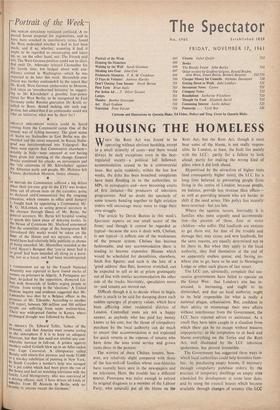HOUSING THE HOMELESS
WHEN the Rent Act was found to be operating without obvious hardship, except in a small minority of cases—and there would always be such exceptions even in the best- regulated society—a political lull followed; accommodation ceased to be a controversial issue. But quite suddenly, within the last few weeks, the dyke has been breached; complaints have been flooding in to the authorities, to MPs, to newspapers and—now becoming courts of first . instance—the producers of television programmes. And no doubt the spectacle of some tenants banding together to fight eviction orders will encourage many more to stage their own struggle.
The article by Derek Barton in this week's Spectator reports on one small sector of the front; and though it cannot be regarded as typical—because the area it deals with, Chelsea, is not typical—it reflects one of the weaknesses of the present system. Chelsea has become fashionable, and any accommodation there is tending to become expensive. Houses which would be scheduled for demolition, elsewhere, fetch five figures; and such is the lure of a 'good address' that flats, however wretched, can be expected to sell or let at prices grotesquely out of line with similar accommodation the other side of the tracks. Inevitably, speculators move in—and tenants are moved out.
Difficult though it is to decide where to begin, there is much to be said for damping down such sudden upsurges of property values, which have been afflicting other residential districts of London. Controlled rents are not a happy answer, as anybody who has paid key money knows to his cost; but the threat of compulsory purchase by the local authority can do much to ensure that accommodation is not exploited for quick returns at the expense of tenants who have done the area some service and grown roots there in the process.
The worries of these Chelsea tenants, how- ever, are relatively slight compared with those of the less-well-off families whose case-histories have recently been seen in the newspapers and on television. Here, the trouble has a different source. Panorama was naïve enough to entrust its original diagnosis, to a member of the Labour Party, who naturally put all the blame on the Rent Act; but the Rent Act, though it must bear some of the blame, is not really respon- sible. In London, at least, the fault lies mainly with the LCC: partly for a failure to look ahead; partly for making the wrong kind of plans when it did look ahead.
Hypnotised by the attraction of higher rents (and consequently higher rates), the LCC for a long time believed in preventing people from living in the centre of London; because people, on balance, provide less revenue than offices— as well as providing tenants who are harder to shift if the need arises. This policy has recently been reversed—but too late.
Where the squeeze occurs, inevitably it is families who most urgently need accommoda- tion—the parents of three, four or more children—who suffer. Old landlords are anxious to get them out, for fear of the trouble and damage they may cause; and new landlords, for the same reasons, are equally determined not to let them in. But when they apply to the local authority, they find themselves at the end of an apparently endless queue; and, having no- where else to go, have to be sent to Newington Lodge or other such places of last resort.
The LCC can, admittedly, complain that suc- cessive governments have failed to operate on the Great Wen: that London's size has in- creased, is increasing, and ought to be diminished; and that no local authority ought to be held responsible for what is really a national plague, urbanisation. But, confident in their ability to mismanage their own affairs without interference from the Government, the LCC have rejected advice or assistance. As a result they have been caught in a situation from which there can be no escape without massive unpopularity; so the temptation to sit back and blame everything on the Tories and the Rent Act, well illustrated by the LCC television spokesmen, has proved irresistible.
The Government has suggested three ways in which local authorities could help homeless fami- lies ; by purchasing empty houses, if necessary through compulsory purchase orders; by the erection of temporary dwellings on empty sites scheduled for development , at some later date; and by using the council houses which become available through changes of tenancy (the LCC has eighty a week, on average). And to this list can be added the possibility of using houses which are condemned not for their own defects but to make way for, say, street-widening schemes. At any given time many such houses are empty, either ,because some leases have fallen in earlier than others in the same block, or because some tenants have moved out to their new accommoda- tion before the target date; and they could easily be exploited to take in families waiting for per- manent homes.
The danger is, of course, that temporary so easily -becomes semi-permanent; prefabs still linger on sites that should long ago have sprouted new houses or blocks of flats. But provided the scheme was kept flexible, and energetically applied, this risk could be combatted. And the money could be found, at least by those councils that have been too vote-wary to do so already, by imposing differential rents; making tenants of council houses pay according to their capacity —or get out to make room for more deserving families.







































 Previous page
Previous page